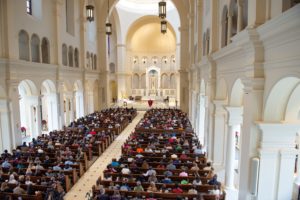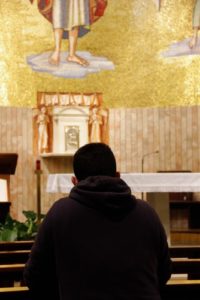In celebration of the Amoris Laetitia Family Year, Universitas republishes the texts of the “Executive Summaries,” one-page evangelization flyers initiated by Dr. Raul Nidoy, faculty member of UA&P, Director of Formation of Parents for Education Foundation (PAREF) and author of Jesus-Centered: Guide to the Happiest Life. The leaflets, which have been printed and shared thousands of times here and abroad, contain key points of Catholic doctrine on topics such as family and chastity, social responsibility, the foundations of the faith, and encountering Jesus. Schools, parishes, and organizations have used the leaflets as a tool for promoting Church teachings. The Executive Summaries can be downloaded here.
If we only knew how God regards this Sacrifice, we would risk our lives to be present at a single Mass. – St. Padre Pio

1.Take part in Jesus’ world-changing sacrifice at Calvary. In a mysterious way, the eternal God “makes present” a two-thousand year old event which is the turning-point of human history: when the greatest evil ever done (killing of God) was turned around by Jesus into the greatest good action—a sacrificial death followed by his resurrection, which saved all men throughout the centuries and gave unsurpassable glory to God. In the Mass, we “time travel” to the event which is the center of our life: the Paschal Mystery.
2. Do the greatest good action. Put together all our good actions, all the social work of NGOs, all the sacrifices of martyrs and saints, and they are just specks of dust compared with the infinite value of Jesus’ sacrifice made present in the Mass. “All good works in the world are the works of men. But the Mass is the work of God.” (St. John Mary Vianney)
3. Receive the most expensive gift. “If you were told by your dad that in a specific room in the city you can get a billion dollar gift, won’t you drop everything to find the place and pick it up? What if the gift is the Owner himself of the entire universe? Shouldn’t you scramble to receive this gift?” (Fr. H. Raynal) In the Mass we receive far more than a billion times of a billion universes filled with treasures. Since God can’t find something greater to express his love, he gives us the ultimate gift: his body, blood, soul and Divinity—Himself.
4. Enter heaven. Encounter Jesus himself in action. We experience heaven touching down on earth and share a foretaste of the heavenly liturgy described in the Book of Revelations. We personally meet Jesus: he who is Infinite Beauty. He himself speaks when the holy scriptures are read (Vat II SC). In a madness of love, he “pours upon us all of his mercy and his love, so as to renew our hearts, our lives, and our way of relating with Him and with the brethren.” (Francis) Jesus tells us: “This is my body which will be given up for you.”

5. Attain the summit of love and prayer. God our Maker created us for one purpose: to love him with all our heart and strength. This is our greatest dignity: to be able to dialogue with the Supreme Being as his intimate friend. In the Mass, we reach the “summit” of our conversation and worship as we join God’s own loving prayer to God. Above all, Jesus unites us to Himself, drawing us into “the very dynamic of his self-giving,” the core of his life. (Benedict XVI)
6. Enjoy the most delightful family reunion feast. In any Mass, we experience singing to the Trinity with the biggest and most harmonious chorus: all of Jesus’ angels and all the children of God’s great family, both living and dead, chanting Holy, Holy, Holy! And to their envy, we do something no angel can do: partake of the banquet from paradise, the Bread and the Lamb of God, “containing in itself all delight.” (Rite of Benediction)

7. Tap into omnipotent help. The Mass is the “summit”, but also the “source” of the Christian life. Its power has greater force than many nuclear bombs! Amazingly, Omnipotence bends down to change bread into God’s body and, like a slave, feeds us. He puts himself at our service. We ask him to help those in need, the poor, the sick, and the suffering souls in purgatory. He sends us with exceedingly powerful grace to help solve the greatest problems of society and to responsibly tackle our personal mission.

8. Be at the best time to talk to Jesus and ask for gifts. There is no better time to ask God for something and to advance in virtue than the moments when we are at our closest to him. While the appearances of bread are not yet digested (10-15 mins.), Jesus is present in our body as in an altar. So stay on after Mass during that time to thank God, adore him and ask for presents.
9. Build and expand the greatest project. In the Eucharist, Christ continues his work of redeeming all men and the Christian shares in this work. The last words of Jesus at Mass, uttered through his priest, resound like his last command to us: Go! Go and make disciples of all nations.
10. Follow Jesus. The secret of Jesus’ joyful and fruitful life is his obedience to God. The Bible gave a one-phrase summary of his life as a child and teenager: “he obeyed”. He saved all men by being “obedient unto death on the cross.” When we go to Mass, we follow his footsteps and obey his command: “Do this in memory of me.”
To willfully miss Mass on Sunday is to commit a sin that is mortal or deadly. Much like the rejection of air, water, and food kills. We can’t survive without the spiritual food offered by God in the Mass. And we have a serious natural obligation to render public worship to our Creator and Sustainer—without whom we vanish. Thus, God commanded us to keep the Lord’s Day holy and his Church states that those who deliberately fail in the obligation to attend Mass on Sundays and holy days of obligation “commit a grave sin.” (CCC 2181)
How to attend Mass:
(1) Be acutely aware that you are in the presence of Christ’s bloody sacrifice on the cross: “In your mind’s eye transport yourself to Calvary.” (St. Padre Pio)
(2) Prepare your soul through prayer.
(3) Wear appropriate clothing when meeting an important person.
(4) Listen to what God is telling you through his Word, the Scriptures.
(5) Pray using words of the Mass and consciously refer them to God.
(6) Offer yourself with Jesus.
(7) Receive Jesus worthily in communion. Go to confession first if in the state of mortal sin. (You commit mortal sin when you offend God in a grave matter, with full knowledge and consent). To receive him in a state of mortal sin is to commit a new sin—the very grave sin of sacrilege.
(8) Thank God profusely for a few minutes after the Mass.
In support of the Pope’s call for a New Evangelization, please share this post or make copies of this and distribute generously, or sell with or without profit.
Banner photo by Robert Cheaib from Pixabay.
Related article:
Paschal Mystery: Center of the Christian Life
Leave a Reply